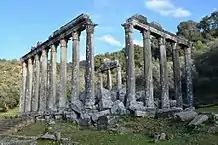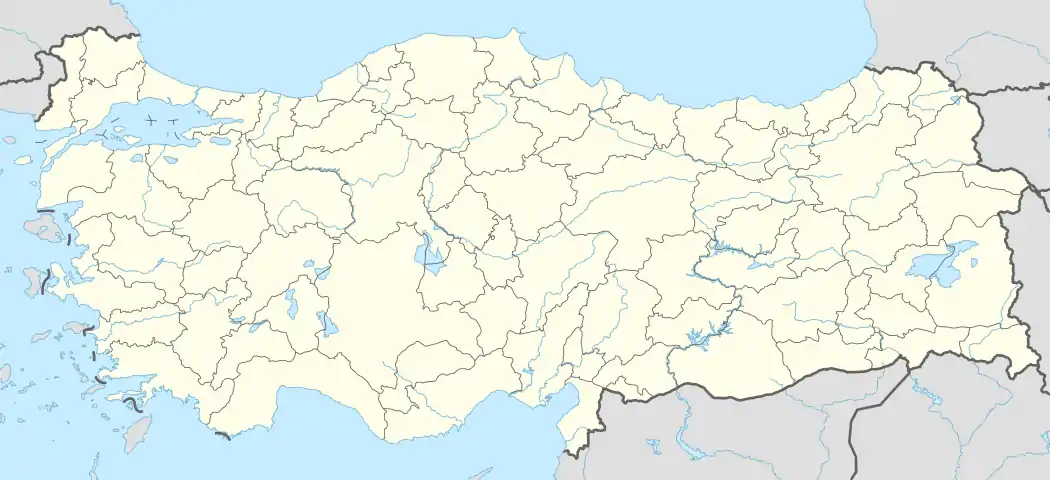Euromus
Euromus or Euromos (Ancient Greek: Εὔρωμος) – also, Europus or Europos (Εὐρωπός), Eunomus or Eunomos (Εὔνωμος), Philippi or Philippoi (Φίλιπποι);[1] earlier Kyromus and Hyromus – was an ancient city in Caria, Anatolia; the ruins are approximately 4 km southeast of Selimiye and 12 km northwest of Milas (the ancient Mylasa), Muğla Province, Turkey. It was situated at the foot of Mount Grium, which runs parallel to Mount Latmus, and was built by one Euromus, a son of Idris, a Carian.[2][3][4][5]
Εὔρωμος (in Greek) | |
 The Temple of Zeus Lepsinos at Euromus | |
 Shown within Turkey | |
| Alternative name | Eunomus, Eunomos, Kyromus, Hyromus |
|---|---|
| Location | Kızılcakuyu, Muğla Province, Turkey |
| Region | Caria |
| Coordinates | 37°22′27″N 27°40′31″E |
| Type | Settlement |
Probably dating from the 6th century BC, Euromus was a member of the Chrysaorian League during Seleucid times. Euromus also minted its own coins from the 2nd century BCE to the 2nd century CE. Under the Roman dominion Euromus belonged to the conventus of Alabanda.[6]
The ruins contain numerous interesting buildings, the most outstanding of which is the temple of Zeus Lepsinos from the reign of Emperor Hadrian. Archaeologists have found terra cotta shards indicating that the temple site had its origins back at least to the 6th century BC. The temple is one of the best preserved classical temples in Turkey: sixteen columns remain standing and most of the columns are inscribed in honour of the citizen who commissioned their construction. Carian rock-cut tombs are also found at Euromus.
References
- Richard Talbert, ed. (2000). Barrington Atlas of the Greek and Roman World. Princeton University Press. p. 61, and directory notes accompanying.
- Strabo. Geographica. xiii. pp. 636, 658. Page numbers refer to those of Isaac Casaubon's edition.
- Stephanus of Byzantium. Ethnica. sub voce Εὔροωμος.
- Polybius. The Histories. 17.2.
- Livy. Ab Urbe Condita Libri (History of Rome). 32.33, 33.30, 45.25.
- Pliny. Naturalis Historia. 5.28.
![]() This article incorporates text from a publication now in the public domain: Smith, William, ed. (1854–1857). "Euromus". Dictionary of Greek and Roman Geography. London: John Murray.
This article incorporates text from a publication now in the public domain: Smith, William, ed. (1854–1857). "Euromus". Dictionary of Greek and Roman Geography. London: John Murray.
- Blue Guide, Turkey, The Aegean and Mediterranean Coasts (ISBN 0-393-30489-2), pp. 321–3